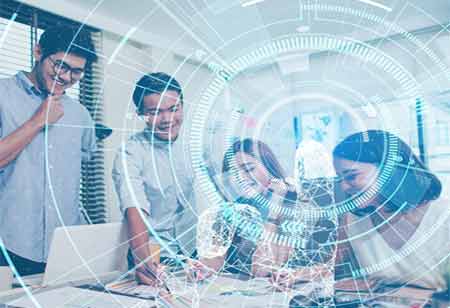THANK YOU FOR SUBSCRIBING
Will Artificial Intelligence Replace Humans In Future?
Artificial Intelligence (AI) is the inducement of human intelligence programmed into machines. Initially, AI started as a machine

By
Apac CIOOutlook | Tuesday, June 28, 2022
Stay ahead of the industry with exclusive feature stories on the top companies, expert insights and the latest news delivered straight to your inbox. Subscribe today.
The advancement in artificial intelligence in the future will not affect jobs, but it would rather enable multitasking roles in various fields.
FREMONT, CA: Artificial Intelligence (AI) is the inducement of human intelligence programmed into machines. Initially, AI started as a machine performing multitasking roles in enhancing production processes and performing trivial mundane tasks. Later, the advantage of AI technology became apparent in various fields. In the future robots will be able to participate in the conversation and even quizzes, or produce paintings and music and exhibit creativity in different forms.
No matter how many AI developments the global business community witnesses, it still can not replace human intelligence. The aspect of human intelligence reflects the ability to feel empathy, make decisions not only based on data but instinct, and identify the emotions of people around to adjust behaviour – a key aspect of human interaction. But the fact that computers are unable to mimic this doesn't imply that AI cannot perform such functions in the future. The advancements in future technology could lead to numerous possibilities. This would remain the biggest debate today.
Envisage the Future
Individuals are excited to see what AI can achieve, despite grave warnings about the possible negative impacts of AI in the future. Possibilities must be accepted with an open mind, trying to leverage AI, while continuing to value human intelligence and emotions. The concern is not about choosing between AI and humans, but rather about building future collaboration where both parties can function together in the future.
As of now, the AI scope is growing faster, inciting fear that hyper-automation could lead to widespread losses of jobs. Experts argue that AI creates workforce disruption rather than destruction, and it will never fully replace humans as it can’t adapt. AI can perform limited tasks carried out by humans, therefore AI should be employed to assist rather than replace workforces. There’s a misconception that AI will replace humans, but AI can be looked at as an empowering tool. Humans are not replaceable and the analytical capability that humans can bring is very difficult for machines to replicate.
Everything has both positive and negative effects. Artificial Intelligence is not an exception. The effects of AI automation range from extremely best to severely worst. And these effects need to be observed and analysed closely before making any assumptions about the long-term effect of AI on society.
Jobs such as writing and editing, graphic designing, and teaching are yet to be automated, all because these jobs need the human touch. With AI-based systems, these jobs can be made easy. But AI can not completely take over these tasks, because academic fields are too much expected from the AI automation trends. Tasks such as grading papers can be assigned to the AI system, but when it comes to teaching or researching, the field still requires human influence.





